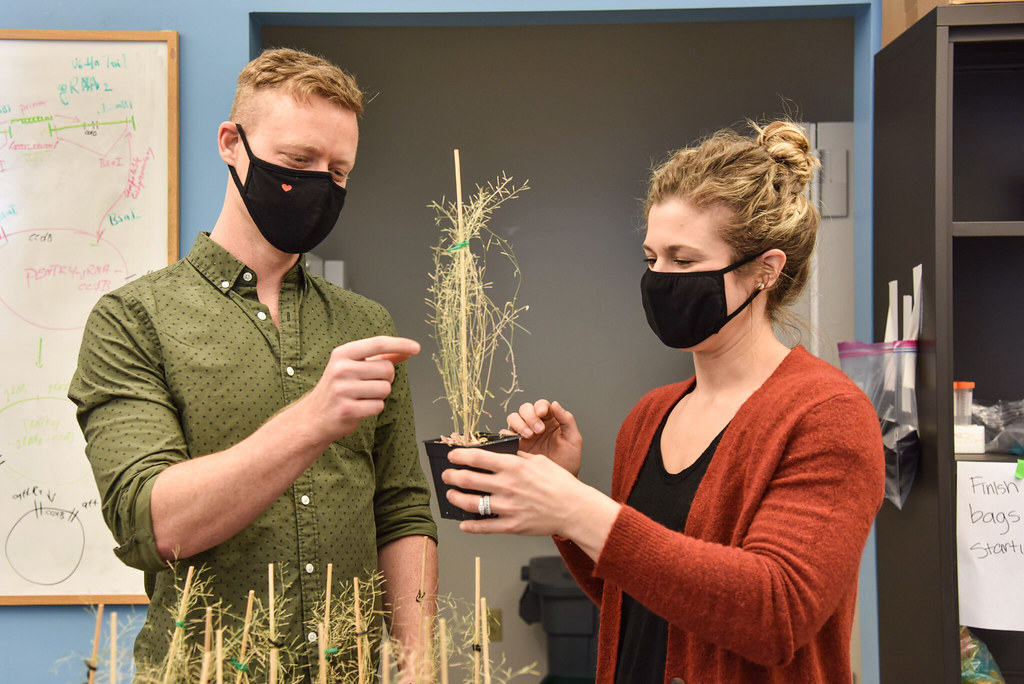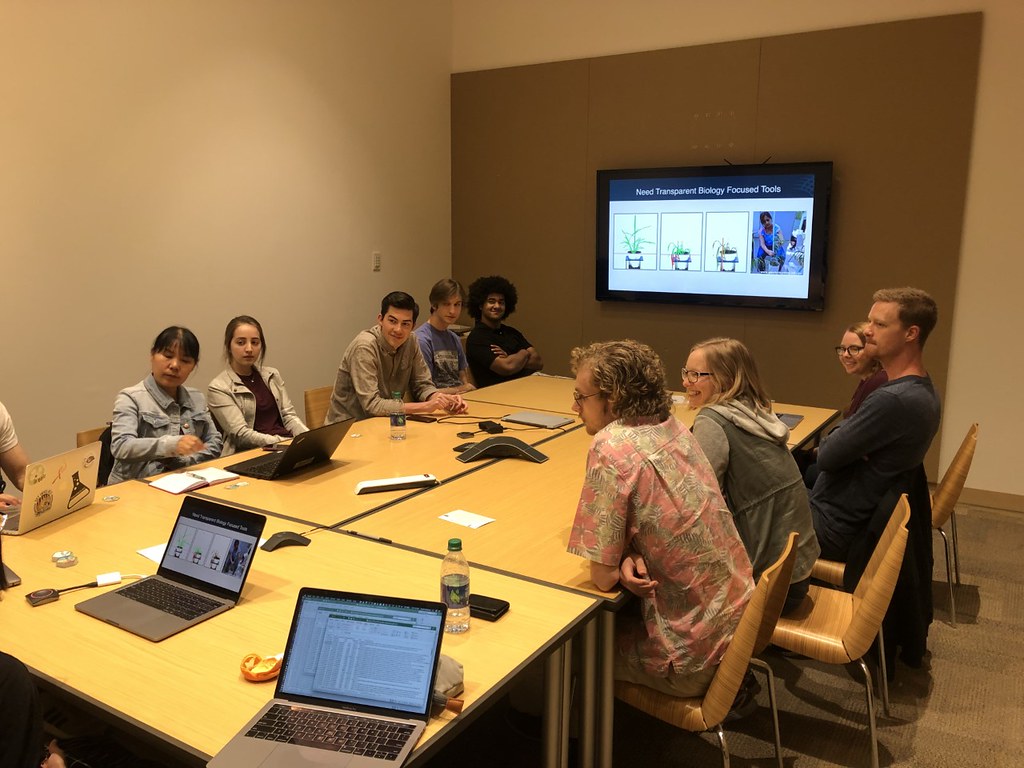Nick Dietz and Marianne Slaten observing a plant in the lab. | photo by Becca Wolf, Bond LSC
By Becca Wolf | Bond LSC
Technology advancements have always driven scientific discoveries in order to perform in depth research, but that has never been more true today.
“A couple of decades ago it was perfectly fine to be an engineer and a biologist and live in your own world,” David Mendoza said. “But as science has advanced, we depend more on mathematics and computer sciences now.”
Mendoza, principal investigator at Bond Life Sciences Center and associate professor of plant sciences, created a program to help develop those skill in the next generation of scientists.
Bioinformatics in Plant Sciences (BIPS) was born in 2016. The undergraduate program pairs plant science or biology majors with computer science or engineering majors. Through research, field trips, and journal clubs, undergraduate students learn how to collaborate on projects and how the two fields help each other.
While Mendoza is the PI who initiated BIPS through a NSF grant, students from all labs are welcome in this program. More recently, a second NSF grant in collaboration with Gary Stacey has allowed the program to expand. BIPS identifies labs that have projects with both computer and biology components for students to work on. Students can also come to BIPS with a project already in mind.
Graduate Student Mentors
BIPS is run by students, for students, with a handful of graduate student mentors and undergraduate students in the program.
The graduate student mentors run weekly meetings, invite in guest speakers, and organize the journal clubs, which is where students review scientific publications and discuss them. Graduate mentors, Marianne Slaten and Nick Dietz, have enjoyed their time and responsibilities at BIPS.
“We make sure they’re on track and don’t get stuck. We want them to become well-rounded researchers,” Slaten said. “It’s a really novel opportunity to jumpstart the next generation of researchers.”
While BIPS cannot go on a field trip this year or have in-person speakers, Slaten and Dietz have come up with alternatives to keep undergrads engaged.
“We’ve been doing workshops showing different bioinformatics tools that can be used to address different research questions,” Dietz said. “We’re also having them do journal club, which gives them a better understanding of the literature surrounding what they are studying. We’re trying to normalize the experience as much as we can, even though everything’s virtual right now.”
A Bioinformatics in Plant Sciences (BIPS) meeting in progress. | photo courtesy of Nick Dietz, Bond LSC
Undergraduates
Undergrads are put into research teams and begin working.
Many projects start with a biology student cataloguing physical plant traits and a computer science or engineering student creates a way to take images of the plants and organize data and information.
“Some of the files you work with are so big you can’t even open them in Excel, so there’s always room for computational people that really know how to harness all that data,” Slaten said. “The files are just so big that your computer crashes. It takes additional skills to know how to deal with that data.”
While a majority of their projects focus on phenotyping, BIPS is looking to branch out into other areas.
“A big problem in biology right now is big data, which you can’t get through that if you don’t have computer science,” said Maddy Creach, a junior from Walter Gassmann’s lab at Bond LSC. “It’s interesting to see the way computer scientists look at problems and that has definitely made me a better researcher, especially since I know 1,000% more about computer science than I did when I started.”
Creach has found that her two years in BIPS helps her think about new ways to think about research.
“A big thing that I have gotten out of BIPS is how to manage my own project,” Creach said. “It’s on me to communicate with my partner and get stuff done and put work towards it, because no one else going to tell me to do it.”
In addition to working on their research and participating in journal club, the undergraduate students are expected to make a poster each year to present their research either at Life Sciences Week or at the Undergraduate Research Forum. Since the pandemic has limited or canceled these events, the students now submit a video of their work online for others to watch.
BIPS’ Impact
Building research and collaboration skills has helped everyone involved.
“I’m learning as much from them as I’m teaching them, so that’s been really awesome,” Slaten said.
Students also hone their communication skills.
“I didn’t realize being a good mentor is a skill set, it’s something you can cultivate over time,” Dietz said. “Oftentimes as students, we think of mentors as either good or bad, you either have it or you don’t. But it’s actually a skill that you can develop over time and I’ve picked that up since I’ve been helping run the program.”
But all remember it’s a learning process.
“Everyone’s really fun and easygoing, no one is judgmental because there is a range in expertise,” Creach said. “There are no dumb questions.”
BIPS has helped many students become well-rounded in their research abilities and is always looking for more students.
“The world is a big place that is moving at a fast pace, and if they don’t get on the train, they are going to miss it,” Mendoza said. “It’s that simple. There’s so much happening in real time, that if you don’t learn how to integrate technology into your research, you’re going lag behind.”
For more information on BIPS or to apply, contact David Mendoza or go to Bioinformatics in Plants (BIPS).



